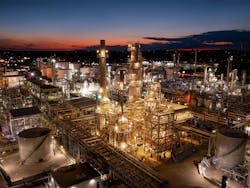Montana Renewables’ biorefinery reaches design processing capacity
Calumet Specialty Products Partners LP subsidiary Montana Renewables LLC (MRL) has achieved the design throughput capacity for processing renewable feedstocks into low-emission sustainable fuel alternatives at the operator’s renewables manufacturing plant in Great Falls, Mont. (OGJ Online, Sept. 8, 2021).
Co-located at fellow subsidiary Calumet Montana Refining LLC’s (CMRL) Great Falls conventional refinery and specialty asphalt plant, MRL’s biorefinery reached its design processing capacity for renewable feedstocks of 15,000 b/sd as of Apr. 18 following commissioning of the operator’s new renewable hydrogen plant on Mar. 4, Calumet said.
While Calumet did not disclose a capacity of the new hydrogen plant, the new installation produces renewable hydrogen—or green hydrogen—by splitting water into hydrogen and oxygen using hydrogen gases collected from the biorefinery’s renewable diesel reactor. The plant then recycles the green hydrogen for reuse within the biorefinery using a patent-pending but yet-to-be-identified technology, according to MRL’s website.
Alongside boosting processing capacity, MRL told investors in a March 2023 presentation that startup of the hydrogen plant also will increase the Great Falls biorefinery’s production of renewable diesel to about 15,000 b/sd from its current 6,000 b/sd output.
MRL said it began producing renewable diesel and renewable naphtha in December 2022 following startup of the biorefinery’s modified hydrocracker on Nov. 5, 2022.
Between December 2022 and the end of February 2023, the Great Falls biorefinery as of March 2023 has produced about 337,000 bbl of on-spec renewable diesel and 28,000 bbl of renewable naphtha, the operator said.
In its latest quarterly earnings and yearend-2022 report to investors released in mid-March, Calumet said MRL also expects to complete construction of a new renewable feedstock pretreatment unit and shipping installations for sustainable aviation fuel (SAF) during April 2023.
Commissioning of the pretreatment unit aims to fully unlock MRL’s geographic advantage in Montana by providing additional renewable feed-quality flexibility via an enhanced ability to remove contaminants from lower-quality biofeedstocks, while startup of the SAF shipping capability will allow MRL to begin SAF shipments to customers already under contract, according to Calumet.
Following completion of scheduled 2023 full-commissioning works, MRL said it expects to sustain an 80% utilization rate at Great Falls to maintain steady-state operations during 2023 to enable a production slate of the following products already fully contracted under multiyear offtake agreements with customers in Canada and the US West Coast:
- 9,000 b/cd of renewable diesel.
- 2,000 b/cd of SAF.
- 1,000 b/cd of renewable naphtha.
A proposed but still-yet-to-be-approved expansion on which engineering work has already started would, during 2024-25, enable the Great Falls biorefinery to produce 230 million gal/year—or 15,000 b/sd—of SAF using a second reactor MRL “opportunistically” acquired previously, MRL and Calumet said.
First announced in February 2021 and initially known as Calumet’s Great Falls renewable diesel project, MRL’s biorefinery involved reconfiguration of the CMRL refinery’s oversized 18,000-b/d mild hydrotreater—added in 2016 as part of an expansion project—to process a mix of renewable feedstocks sourced from local farms and ranches—including camelina, canola, mustard, and other non-soybean oils—to produce an array of low-carbon fuels in line with the global energy transition initiative (OGJ Online, Aug. 23, 2021).
About the Author
Robert Brelsford
Downstream Editor
Robert Brelsford joined Oil & Gas Journal in October 2013 as downstream technology editor after 8 years as a crude oil price and news reporter on spot crude transactions at the US Gulf Coast, West Coast, Canadian, and Latin American markets. He holds a BA (2000) in English from Rice University and an MS (2003) in education and social policy from Northwestern University.

